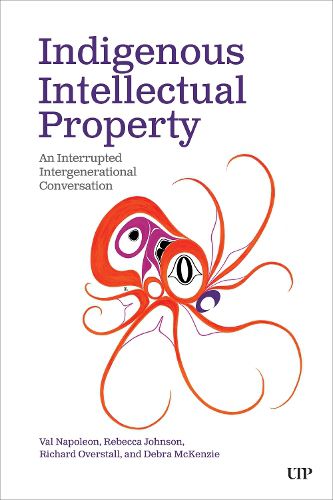Readings Newsletter
Become a Readings Member to make your shopping experience even easier.
Sign in or sign up for free!
You’re not far away from qualifying for FREE standard shipping within Australia
You’ve qualified for FREE standard shipping within Australia
The cart is loading…






Historically, Indigenous art and cultural/societal expression, intellectual property (IP) has been identified and examined within Canadian or international legal regimes. This book moves the discussion to within specific Indigenous legal orders. Indigenous Intellectual Property opens up complex discussions about existing Indigenous intellectual property law, and avoids the tendency to pigeonhole Indigenous IP into a Western legal model.
Drawing on diverse case studies, this book considers the existing laws in the Gitxsan, Secwepemc, and Hupacasath (Nuu-chah-nulth) legal orders, as well as from the Solomon Islands and Hawai'i. The case studies are grounded in their respective legal and oral histories, and contextualized within a broader discussion of Indigenous law, addressing issues of colonial myths, shrinking conceptions of Indigenous law, common resistances to Indigenous property and law, and important connections between Indigenous law and governance and citizenship.
The book carefully considers how the governance and civic value of intellectual property points to the unsuitability of the current state and international IP legal regimes to many Indigenous intellectual property concerns. Ultimately, Indigenous Intellectual Property reveals the various ways in which to identify and understand law within Indigenous societies through narrative and story analysis, observations of practices and ceremonies, and political and legal ordering.
$9.00 standard shipping within Australia
FREE standard shipping within Australia for orders over $100.00
Express & International shipping calculated at checkout
Historically, Indigenous art and cultural/societal expression, intellectual property (IP) has been identified and examined within Canadian or international legal regimes. This book moves the discussion to within specific Indigenous legal orders. Indigenous Intellectual Property opens up complex discussions about existing Indigenous intellectual property law, and avoids the tendency to pigeonhole Indigenous IP into a Western legal model.
Drawing on diverse case studies, this book considers the existing laws in the Gitxsan, Secwepemc, and Hupacasath (Nuu-chah-nulth) legal orders, as well as from the Solomon Islands and Hawai'i. The case studies are grounded in their respective legal and oral histories, and contextualized within a broader discussion of Indigenous law, addressing issues of colonial myths, shrinking conceptions of Indigenous law, common resistances to Indigenous property and law, and important connections between Indigenous law and governance and citizenship.
The book carefully considers how the governance and civic value of intellectual property points to the unsuitability of the current state and international IP legal regimes to many Indigenous intellectual property concerns. Ultimately, Indigenous Intellectual Property reveals the various ways in which to identify and understand law within Indigenous societies through narrative and story analysis, observations of practices and ceremonies, and political and legal ordering.